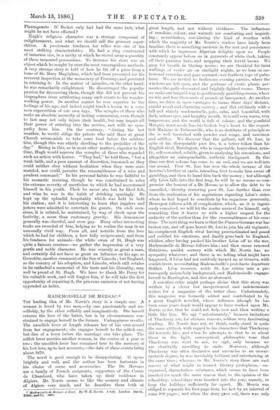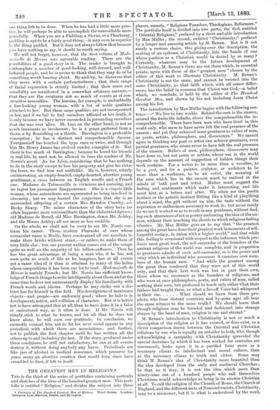MADEMOISELLE 1)E MERSAC.*
THE leading idea of Mr. Norris's story is a simple one. A woman is loved by two men,—by one passionately and un- selfishly, by the other selfishly and imaginatively. She herself returns the love of the latter, but is by circumstances con- strained to engage herself to the former. Unhappiness results. The unselfish lover at length releases her of his own accord from her engagement; she engages herself to the selfish one, but dies of a fever before the marriage can take place. The selfish lover marries another woman, in the course of a year or two ; the unselfish lover has remained true to the memory of his lost love, up to last accounts,—the date of these events being about 1870.
The novel is good enough to be disappointing. It opens brightly and well, and the author has been fortunate in his choice of scene and accessories. The De Mersacs are a family of French emigrants, supporters of the Comte de Chambord, who have taken up their residence in Algiers. Mr. Norris seems to like the scenery and climate of Algiers very much, and he describes them both at
• Mademoiselle de Mersae: a Novel. By W. E. Norris. 3 vole. London Smith, Elder, and Co. 1880. great length, and not without vividness. The influences of sunshine, colour, and warmth are comforting and inspirit- ing ; nevertheless, considering the kind of weather with which the majority of Mr. Norris's readers have lately been familiar, there is something sardonic in the zest and persistence with which he impresses Algerian delights upon us. People constantly appear before us in garments of white duck, taking off their panama bats, and mopping their fervid brows. We gasp for breath in blazing noons ; we are thankful for faint waftings of cooler air on starlight nights, as we lean on em- bowered verandas and gaze seaward over feathery tops of palm- trees. We are invited to frolicsome evening parties, where the windows are left open, and the perfume of exotic plants per- meates the gaily•decorated and brightly-lighted rooms. Thence we make our languid way to gentlemanly gambling-rooms, where we win and lose thousands of pounds at lausquonet. At another time, we drive iu open carriages to farms three days' distant, amidst novel and charming scenery ; and flirt sublimely with a tall and stately mademoiselle, pale, calm, and beautiful, with dark, serious eyes, and haughty mouth. It is still very warm, very languorous, and the world is full of colour ; and the youthful Marquis must needs lose his foolish boy's heart to the coquet- tish Madame de Tremonville, who is as destitute of principle as she is well furnished with powder and rouge, and sauciness and artifice. We discover that the gallant, tall St. Luc, in spite of his disreputable past life, is a better fellow than his English rival, Barrington, who is respectable, benevolent, artis- tic, self-conceited, voluble, given to analysing his sensations, and altogether an unimpeachable, amthetic blackguard. By this time our first volume has come to an end, and we are well into
our second. Poor St. Luc has won the whole fortune of the heroine's brother at cards, intending first to make him swear off gambling, and then to hand him back the money ; but although silly Leon falls into the first trap, he will by no means so com- promise the honour of a De Mersac as to allow the debt to be cancelled,—thereby removing poor St. Luc further than ever from the realisation of his aspirations regarding Leon's sister,. whom he had hoped to conciliate by his sagacious generosity. Hereupon follows a bit of complication, which, as it is ingeni- ously conceived, we will let the reader unravel for himself, only remarking that it leaves us with a higher respect for the audacity of the author than for the reasonableness of his crea- tions. The next thing we learn is that the Franco-German war has broken out, and off goes heroic St. Luc to join his old regiment,. his complacent English rival having procrastinated and posed and coddled his emotions, and finally gone back to England, whither, after having packed his brother Leon off to the war, Mademoiselle de Mersac follows him ; and then ensue renewed flirtations, amidst scenery with which Mr. Norris has no sympathy whatever ; and there is no telling what might have happened, if Leon had not suddenly turned up at Geneva, with scarlet-fever, necessitating Mademoiselle's post-haste departure thither. Leon recovers, noble St. Luc retires into a pic- turesquely melancholy background, and Mademoiselle engages herself to Barrington, and dies as aforesaid.
A sensitive critic might perhaps divine that this story was written by a clever but inexperienced and indeterminate writer, for a magazine of the better class. Unfortunately, this magazine was formerly edited and contributed to by a great English novelist, whose influence (though he has been some years dead) would appear to have worked upon Mr. Norris so far, that he could not help now and then writing a little like him. We say " unfortunately," because imitations of Thackeray are, for obvious reasons, seldom very fascinating reading. Mr. Norris does not, we think, really stand in quite the same attitude with regard to his characters that Thackeray did towards his ; and when he attempts to chat to us about them in the light, semi-cynical, philosophic tone that Thackeray was wont to use, we sigh, only because we are charitably unwilling to smile. Moreover, although Thackeray was often discursive and unconcise to an unwar- rantable degree, he was inevitably brilliant and entertaining at the same time ; whereas, in Mr. Norris's story there are vast masses of what might be termed literary protoplasm,—un- organised, characterless substance, which seems to have been inserted for much the same reason that, in the opinion of the school-boy, school-days were inserted into the year, namely, to keep the holidays sufficiently far apart. Mr. Morris was obliged to separate his first page from his last by an interval of some 998 pages ; and when the story gave out, there was only
one thing left to be clone. When he has had a little more prac- tice, he will perhaps be able to accomplish the unavoidable more gracefully. When you are a Fielding, a Sterne, or a Thackeray, padding is apt to be a fairly good thing,—it may even be superior to the thing padded. But it does not always follow that because you have nothing to say, it should be worth saying.
We will not forget, however, that the first volume of Made- moiselle de Mersae was agreeable reading. There are the p)ssibilities of a good story in it. The reader is brought to contemplate a number of good-looking, well-dressed, and well- behaved people, and he is prone to think that they may do or be something worth hearing about. By-and-by, he discovers that they move with a certain perfunctoriness ; that their range of facial expression is strictly limited ; that their sense and sensibility are manifested in a somewhat arbitrary manner,— that they are the creatures not so much of events as of con- structive necessities. The heroine, for example, is undoubtedly a, fine-looking young woman, with a list of noble qualities attached to her. But these same qualities are not incorporated in her, and if we fail to find ourselves afflicted at her death, it is only because we have never succeeded in persuading ourselves that she was ever alive. St. Luc, on the other hand, is not so much inanimate as incoherent; he is a grape gathered from a thorn, a fig flourishing on a thistle. Barrington is a preferable conception ; he has a distinct and comprehensible flavour. Tourguenieff has touched the type once or twice, and through him Mr. Henry James has evolved sundry examples of it. But there is too much of Barrington ; because he bored his friends in real life, he need not be allowed to bore the readers of Mr. Norris's novel. As for Leon, considering that he has nothing to do in the story except to lose his property and give his sister the fever, we find him not unlifelike. He is, however, utterly -uninteresting, an empty-headed, empty-hearted, abortive young gentleman, a cross between an English noodle and a French one. Madame de Tremonville is vivacious and amusing, and we regret her premature disappearance. She is a risquee little woman, whose antecedents are represented as being involved in obscurity ; but we may hazard the conjecture that she is an unrecorded offspring of a certain Mrs. Rawdon Crawley, née Becky Sharp. The minor characters of the story have (as often happens) more verisimilitude than the elaborated figures ; old Madame de Breuil, old Miss Barrington, dense Mr. Ashley, and the Misses Ashley, all are more or less credible.
On the whole, we shall not be sorry to see Mr. Norris con- tinue his career. Those modern Pharaohs of ours whose vernacular name is Mudie, have constrained all our novelists to make their bricks without straw,—or rather, to make them of very little else ; but our present author comes out of the scrape quite as well as the majority of his fellow-sufferers. Then he has the great advantage of being a man who, if he has not seen quite so much of life as he imagines, has at all events got a saner idea of it than is attained by many of the ladies whose compositions it has been our lot to read. Mademoiselle de Mersac is mainly French ; but Mr. Norris has sufficient know- ledge of French things to write intelligently about them, and at the same time he does not unnecessarily display his familiarity with French words and idioms. Perhaps lie may strike out a dis- tinct line for himself in this field. His descriptions of inanimate objects—and people—are uniformly good ; where he fails is in development, action, and collision of character. But it is better not to have attempted this at all, than to have done it in a false or caricatured way, as it often is done. If Mr. Norris will simply stick to what he knows, and let all that he does not know alone, he will earn our gratitude. In conclusion, we earnestly counsel him not to let his next serial appear in any periodical with which there are associations ; and further, not to publish the first chapter until he has written all the others up to and including the last. If the story, produced under these conditions, be still not satisfactory, he can at all events destroy it, without doing anybody any harm. Periodicals are like jars of alcohol in medical museums, which preserve for years many an abortive creation that would long since have crumbled to dust, if left to itself.



































 Previous page
Previous page